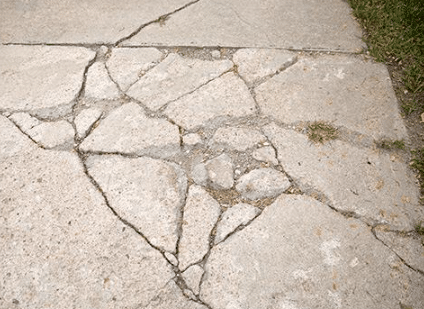Why Concrete Cracks In Winter In Imperial Beach?

- Concrete is most vulnerable to cracking due to temperature fluctuations which occur in winter months as temperatures rise and fall throughout the day. When temperatures fluctuate too quickly or dramatically, cracks may appear in the concrete due to thermal stress.
- When moisture present in concrete freezes, it expands and causes pressure on surrounding materials including the concrete itself. This expansion leads to cracks that can be both wide and deep making them difficult to repair without specialized equipment.
- Concrete shrinks as it sets and hardens. In cold winter temperatures, this shrinkage can cause hairline cracks to form in the concrete as it contracts during its curing process.
- When exposed to deicing chemicals like salt or calcium chloride, concrete is vulnerable to deterioration due to chemical reactions with the surface of the material leading to cracking.
- Concrete needs an adequate base foundation for proper installation and longevity. During colder weather, improper preparation can lead to insufficient compaction of the soil beneath which causes shifting that leads to cracking in the concrete slab above.
- Proper curing time for concrete requires a minimum temperature range between 50-70 degrees Fahrenheit. In cold winter months, this temperature range is not always achievable, leading to premature drying and cracking in the concrete surface.
- When concrete isn’t mixed properly it can lead to porous areas with inadequate strength that are prone to cracking due to expansion and contraction caused by changing temperatures.
FAQ’s
What Is The Main Reason Of Concrete Crack?
Temperature fluctuations due to cold weather are the main reason for concrete cracks.
Where Is Concrete Most Likely To Crack?
Concrete is most likely to crack in areas with extreme temperature fluctuations, exposure to de-icing chemicals, poor preparation of the foundation or insufficient curing time.
Can I Repair Concrete Cracks?
Yes, there are several methods for repairing concrete cracks such as using a patching compound or epoxy injection. It is best to consult with a professional for more information on the best solution for your particular situation.
Conclusion
It is important to be aware of the potential for concrete cracks during cold winter months. By understanding why these cracks occur and how to prevent them, you can better protect your investment in a quality concrete surface or structure. For more information, contact Concrete Contractor Imperial Beach at (619) 414-1918.